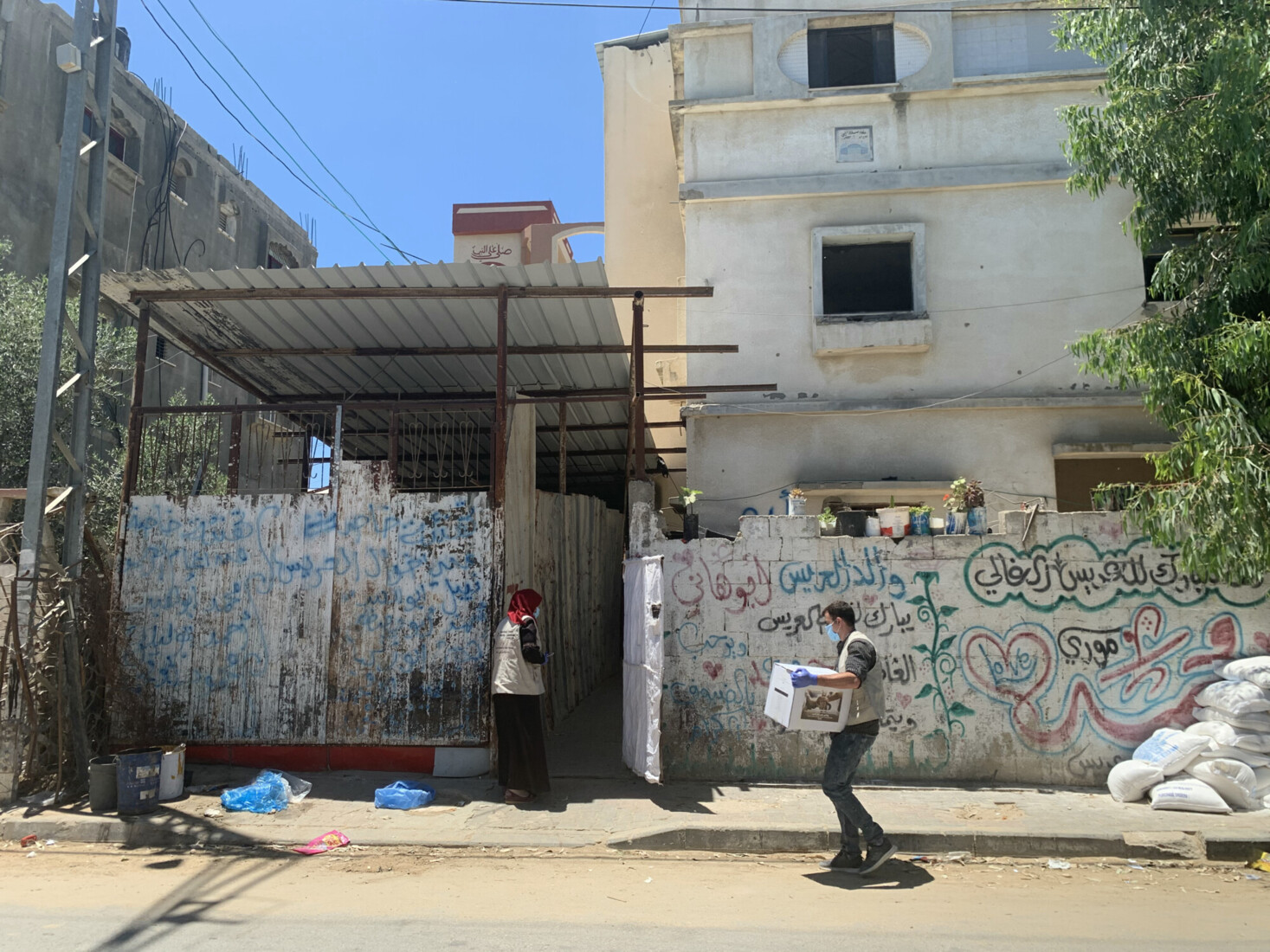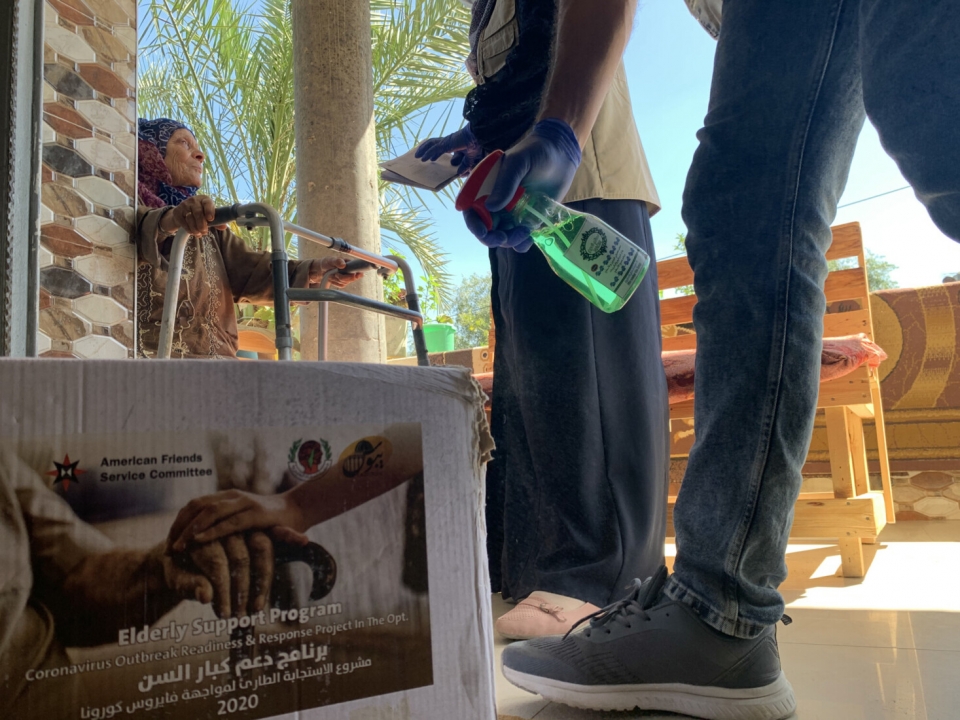
Since the start of the pandemic, AFSC has distributed food assistance and hygeine items to hundreds of seniors in Gaza and the West Bank. Middle East / AFSC
In recent weeks the Biden administration has indicated that it will restart relations with the Palestinian Authority and may restore humanitarian funding to the U.N. Relief Works Agency (UNRWA)—the primary health, education, and assistance provider to millions of Palestinian refugees across the Middle East—as well as other humanitarian groups in Palestine. This change in policy, which will provide vital and life-saving aid at a time of unprecedented need if implemented, should be welcomed.
At the same time, we must recognize that the U.S. must do much more than provide humanitarian assistance to address the crisis in Palestine. We need political action—and a transformation in U.S. policy—to bring sustainable change and justice in Palestine and Israel.
Humanitarian assistance should never be used as a political cudgel. But under the Trump administration, U.S. aid to Palestine was explicitly politicized. Funding allocated to the Palestinian Authority, UNRWA, and other humanitarian organizations operating in the occupied Palestinian territory was withheld to pressure the Palestinian Authority to accept dictates put forward by the Trump administration in close coordination with the Israeli government. As a result, vital services like health care and education as well as food aid, cash assistance, and other needs-based programs were suspended or cut. Politics, not need, became the driver of U.S. development and humanitarian policies.
Over the past four years, AFSC and other humanitarian, peacebuilding, and faith-based groups have called for the U.S. to resume assistance and depoliticize humanitarian giving. Many members of Congress heard our concerns and issued their own calls for a resumption of U.S. aid to Palestine.

While these calls went unheeded by the Trump administration, the new Biden team has indicated that they will restore humanitarian funding in Palestine and reopen relations with the Palestinian Authority—an important first step toward change in U.S. policy towards Palestine.
However, as the U.S. moves to reopen relations with the Palestinian Authority and aid again starts to flow, we must understand that humanitarian assistance is a band-aid that will not address the core injustices and inequalities that exist in Israel and Palestine.
In fact, U.S. policy explicitly supports the very political actions that have created the crises that development and humanitarian assistance are meant to address. Here are just some examples:
- Every year, the U.S. sends $3.8 billion in military aid to Israel, directly sustaining the occupation and violations of Palestinian rights.
- In Gaza, a past USAID program subsidized the development of onshore fish farms to generate income for Palestinian families and support the Gaza economy. At the same time, the U.S. has supported the Israeli blockade on Gaza, which has led to a 45% unemployment rate among Gaza fishers who are now banned from accessing key fishing zones.
- In the West Bank, USAID has invested hundreds of millions of dollars in road construction projects over the last two decades. While this work is sold as important for improving the lives of Palestinians, many of the roads repaired and constructed by the U.S. are only needed because Israel has banned Palestinians from traveling on other roads in the West Bank.
- Some of the first U.S. funding to be restored will likely go toward Palestinian hospitals, particularly East Jerusalem hospitals that provide treatment to Palestinians from both the West Bank and Gaza who need cancer treatment or other life-saving care. Yet many Palestinian patients often can’t reach care in time because movement restrictions in the West Bank and Gaza requires Palestinians to obtain Israeli military permits—another policy that the U.S. has not opposed.
- Over the past 20 years Israel has carried out repeated military attacks on both the West Bank and Gaza, causing deaths and destruction to infrastructure and the economy. After each of these attacks, the U.S. government has helped fund reconstruction—but in every instance, it has also supported the attack, funded the weapons used, and blocked efforts to demand accountability from those responsible to prevent future attacks.
It is time to demand real change. Resuming U.S. humanitarian assistance to Palestine is important in providing vital and life-saving aid. But the United States must do much more to support lasting peace in Israel and Palestine.
This means immediately ending U.S. military aid to Israel, demanding accountability by Israel for ongoing violations of Palestinian rights, and pushing for an end to the policies and actions that are at the roots of humanitarian crises. It also means working to end the occupation, protecting the rights of refugees, and ensuring equality for all people in Palestine and Israel.
No amount of humanitarian aid will sustainably and justly address the roots of what is happening in Palestine without political action.